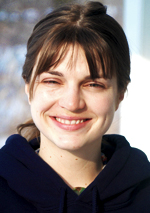The Soul Returns to the Land It Knows

 |
In addition to reading widely on the topic—as presented in scientific articles, Biblical stories, mythology, and literature—Nyala worked at an intimate violence shelter during her final year at Hampshire.
Her thesis, entitled The Soul Returns to the Land It Knows, challenges the ways that our culture often thinks about resilience. She wrote an analytical paper, a fictional narrative (long story form) examining the effects of child abuse, and a nonfiction essay to bridge the two.
"Because the issues around child abuse are complex, my approach needed to come from an interdisciplinary perspective that embraced complexities and challenged conventions," said Nyala.
Nyala is working on a monologue based on a particularly graphic excerpt from her fictional writing, which she shares below:
"I want to remember that I stood up to Dad. That I hurt him for what he did to Ben. In my mind, I have picked up the rifle and used it to search for his brains until his head was spread thin, sticking to the carpet, his eyes the only parts left, pleading up at me. In my nightmares, it's my eyes on the floor, pleading to him. Standing above my broken body, I am my father at the same time as I am myself, confused and exhausted, unable to rest. I wake up sweating, heart pounding. I can't sleep with these thoughts in my head.
"The only peace I've found comes in brief moments in the evenings, when Mom and Ben and the dogs and I are in the living room. Surrounded by them, I don't have to be afraid and I don't have to dwell on thoughts of my father and me mixed up in a dance in which I can't remember who was leading. In those moments, I relax while Mom rubs my back, her touch as good as drinking warm caramel sauce, and listening to the stories I am released from the pain and confusion.
"She's reading to us from Bulfinch's Mythology. I love the gods and goddesses, heroes, and quests. We're in the part about Odysseus, who is trying to get home to his wife who he loves very much but can't get there because all these demons keep trying to stop him. Some guy named Milton wrote that Odysseus' men were lured by singing, their prisoned souls taken into the Underworld. That stays with me. Sometimes, at points in the story like these, when all the odds are stacked against Odysseus, Ben and I jump in with how we'd outsmart the bad guys. Then she keeps reading. And sometimes Odysseus does just what we would've done."
Division III Faculty Committee: American literature and Jewish studies professor Rachel Rubinstein and psychology and child studies professor Rachel Conrad (co-chairs). Deborah Gorlin, co-director of Hampshire's writing center, was the third committee member.
Article Tags

